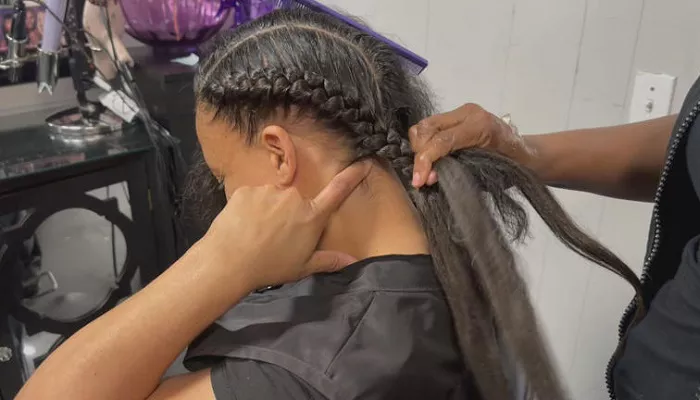WILMINGTON, N.C. (WECT) – A popular protective hairstyle among many women, especially in the Black community, is now under scrutiny following a recent report revealing the presence of harmful chemicals in synthetic braiding hair.
For over three decades, Rochelle Fleming, the owner of Rochelle’s Hair Studio in Wilmington, has been styling hair, with braids being a consistent favorite among her clients. According to Fleming, braids are valued for their versatility, convenience, and low-maintenance appeal. “It’s protective, it’s easy, get up and go, no fuss. We love our braids,” said Fleming, noting that many women feel more comfortable wearing braids than their natural hair.
However, the safety of this widely embraced hairstyle has been questioned in light of a new investigation by Consumer Reports. The study found that several popular synthetic braiding hair products are contaminated with chemicals that pose potential health risks, including cancer.
James Rogers, the Director of Product Testing at Consumer Reports, reported that women have complained of unpleasant smells, scalp irritations, and neck discomfort after using these products. “Women report having to remove the braids because of these issues,” said Rogers.
The investigation tested ten popular synthetic braiding products, revealing concerning levels of hazardous substances. Among the findings, three products from brands Sensationnel and Magic Fingers contained benzene, a well-known carcinogen linked to leukemia. Additionally, 90% of the tested products showed dangerously high levels of lead, which is associated with immunosuppression and certain cancers. Lead exposure, especially in children, can disrupt the development of the nervous system and negatively impact IQ.
“There is no safe level of lead exposure,” emphasized Rogers. “These levels in synthetic hair products are highly concerning.”
While this report marks the beginning of a broader inquiry into the health effects of synthetic braiding hair, Rogers hopes that further studies will establish a clearer link between these chemicals and health outcomes.
Sensationnel, one of the brands implicated in the study, responded to the findings, expressing surprise at the results and questioning the methodology of the investigation. “We unequivocally stand by the safety of Sensationnel products, and our company urges consumers to continue to confidently use Sensationnel products,” the company said in a statement.
Despite the brand’s stance, Fleming, who has long been aware of the concerns surrounding synthetic hair, finds the report disappointing but not entirely surprising. “It’s something that has always been around; we just didn’t pay enough attention to it,” she said.
Fleming is now encouraging people to consider cleaner alternatives or even embrace their natural hair. She shared a personal example, saying, “My daughter wears a fro and she goes to a mixed school. She is always wanting to put braids in her hair. I’m always telling her how beautiful she is. She doesn’t need to wear braids. She can wear her own hair to represent her beauty and culture.”
To reduce potential risks, experts recommend cleaning synthetic hair before use, checking for product recalls, and carefully reading labels.
Fleming, however, holds a larger hope: “What’s the hope? Really… that Black people just wear their own hair and represent because we don’t need it. We love it, but we are beautiful without it, too.”
The Consumer Reports investigation has sparked an important conversation about the safety of products used in the beauty industry, urging consumers to remain vigilant and prioritize their health when making choices about hair care.
Related topics:
- Experts Dispel Myths Linking Headgear to Hair Loss
- Fact Check: Can Ginger and Lemon Juice Cure Head Lice in One Wash?
- Barron Trump’s Casual Look and Tousled Hair Capture Attention on the Internet


